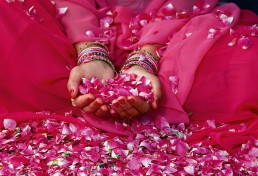A sacrifice to the gods, Gujarat, India.
Inspired by a similar scene I witnessed during a religious ceremony in a Hindu temple, I composed this shot in the state of Gujarat so that the petals symbolized a multitude of spiritual paths – each is a fragment of one and the same rose, a symbol of one and the same immutable truth.
If you are a teacher
Dalai Lama
I am convinced that mankind’s progress or decline depends largely on educators and teachers, which imposes a great responsibility on them. If you are a teacher, try to not only impart knowledge, but also to sensitize the minds of your pupils to the basic human values, such as goodness, compassion, the ability to forgive and a sense of accord. Let these not be subjects reserved only for traditional morality or religion. Show them that these are the qualities simply essential for happiness and the survival of our world.
Teach them how to conduct conversations, that any conflict can be resolved without resorting to violence, and that whenever there is a dispute, it is worth taking an interest in how the other side thinks. Teach them to see things from a broader perspective, not only from one point of view, to think not only of themselves, their environment, country, or race, make them realize that all beings have the same rights and the same needs. Show them what universal responsibility means, and show them that whatever we do is important, that it all somehow affects the rest of the world. Do not settle for just words, but set an example so that your pupils will better remember what you say to them. Be responsible for the future of your pupils in all respects.
His Holiness the Dalai Lama, from the book “365 méditations quotidiennes du Dalaï-Lama”, Matthieu Ricard Editor, Pocket Editions (anthology), 2013
His Holiness the 14th Dalai Lama Tenzin Gyatso – born 1935 in the village of Taktser in north-eastern Tibet, a Buddhist monk of the Gelug or Yellow Hat tradition, enthroned as the temporal and spiritual leader of Tibet on November 17th 1950, a month after the Chinese army marched into Tibet. In 1959, he went into exile in India, where he established the Tibetan Government in exile, which he headed until his withdrawal from politics in March 2011. For more than 50 years he has lived as a refugee in Dharamsala, and is considered the supreme spiritual leader of Tibetan Buddhism. In 1989 he was awarded the Nobel Peace Prize for his work towards a peaceful settlement of the Sino-Tibetan conflict.

 Polski
Polski